Here is a video that tells the story of a drive-in prayer outreach conducted by one of GCI’s congregations in Southern California.
On YouTube at http://youtu.be/8d0MJsKApLY.
Here is a video that tells the story of a drive-in prayer outreach conducted by one of GCI’s congregations in Southern California.
On YouTube at http://youtu.be/8d0MJsKApLY.
Members of the 4/14 Window Group of the GCI congregation in Santa Rosa, Philippines recently traveled to Davao, Philippines, where they shared their abilities and other resources in assisting with children’s ministry. To read about this outreach event, click here.
October is Pastor Appreciation Month in the United States and Canada. Here is the story of how one congregation showed its appreciation for their pastor.
On a recent September morning, Wayne Mitchell, pastor of GCI’s congregation in Seattle/Bellevue, Washington, headed for the hills (the home of Mike Hills, that is). There he met up with a “band of brothers” from his congregation. After sharing breakfast, the men took to the woods with chainsaws, pruners, and a four-wheeler, and proceeded to fell some trees. Four hours later they had cut, split and stacked a couple of cords of wood to be given to Pastor Wayne. The men wanted to show their pastor how much they appreciate him and all he does in serving the congregation. They also wanted to help keep Wayne and his wife warm and cozy this winter. Here are some pictures:

This announcement is from Bret Miller, manager of GCI’s Information Technology Department.
Are you wanting to change the information displayed for your church on the GCI.org website’s church finder (at http//www.gci.org/participate/find)? If so, here’s how:
By default, we display the pastor for a church as the contact person, including their phone and email. If you prefer that prospective attendees contact a different person, you can fill in the contact name, phone and email here. If you do so, we no longer display the pastor’s information and display the contact person instead.
Over the years a number of pastors have asked for the ability to write something about their church. The description box is now where you can do that. Basic HTML markup should work there for those of you who want more than text. You might use it to note a special event when you’re meeting at a different location. Or if you’re a fellowship group, you might want to describe what your meeting is like. Or you could use it to introduce your church. It’s entirely up to you.
For fellowship groups, we do not automatically display a meeting address because many of them change weekly or meet in homes where the homeowner may not want the address made public. For those that meet in the same location every week and want the address displayed, you can check the box.
Any time we display an address for a church, we also include a map link. Occasionally, this link doesn’t work properly. If your church is one of those, you can find your own public map website like https://www.google.com/maps or http://www.mapquest.com/, make a map for your church and copy the URL of that map into the Map URL box. Then any time we display a map link, we’ll use that instead of trying to make one automatically from the address.
We hope this information will help you make the most of your church information posted on the GCI.org website.
Here is part 6 of an 8-part essay by Dr. Gary Deddo titled “The Christian life and our participation in Christ’s continuingministry.” To read other parts, click on a number: 1, 2, 3, 4, 5, 7, 8. For all 8 parts combined in one article, click here.
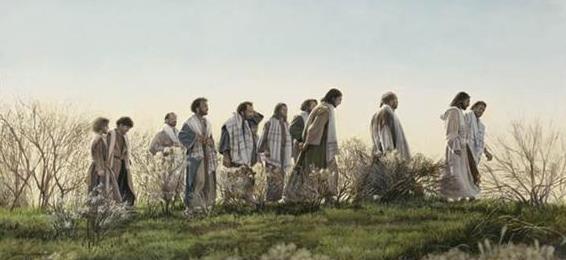
In part 5 we examined the story of Jesus and the feeding of the 5,000 and how that is a model of our participating with Christ in his ministry. In that story, we see the original disciples moved to action, giving rise to a related, crucial question: How do we motivate Christians to active participation in ministry with Jesus?
Ironically, having understood something of our participation in the ongoing ministry of Jesus, in turning to the related topics of preaching, teaching and counseling, we can easily revert to addressing people in ways that ignore the reality of our union and participation with Jesus. When we focus on our own obedience, we are in the habit of thinking that our individual will is the key to our behavior and actions. If something is going to get done, then we tend to depend on one of two things: 1) the strength of our own wills, or 2) the effectiveness of our native or learned skills, and their deployment in the programs, plans, techniques or formulas available. But if we lack both these, we may simply conclude that we have no responsibility at all. It must be someone else’s calling.
How do we properly call people to join us in the Christian life as communion, fellowship, and partnership with Christ?
First, let’s consider how all of Scripture is structured as it invites us to participate. As the Torrance brothers reminded us so often, all the commands of God are built on the premise of the unconditional covenant promises of God. All obedience is moved by faith in the character of God. “I will be their God, and they shall be my people” is the foundational refrain throughout the Old Testament (see Jeremiah 31:33, Genesis 17:8 and Exodus 6:7). God made a unilateral covenant with Abraham: “I will bless you… in you all the families of the earth shall be blessed” (Genesis 12:2-3). That covenant is renewed throughout Israel’s history. It was not, Paul reminds us, until 430 years after God made his covenant with the people who were to be a light to all the nations, that God provided them with the law (Galatians 3:17). The law falls within the circle of the unconditional promise of blessing.
Notice how the Ten Commandments unfold. They were given after the great Exodus of Israel from slavery under the Egyptians. Then, in Exodus 20:2, we find a theological preface to those holy obligations: “I am the LORD your God who brought you out of the land of Egypt!” Then the commands follow as a result of this saving work. We could insert a “so” or “therefore” before each one. “I graciously brought you out of Egypt, so you shall have no other gods before me. So “you shall not take the name of the LORD your God in vain.” So, “Remember the Sabbath day, to keep it holy.” So, “you shall not murder…commit adultery…steal….covet.”
That theological preface calls all Israel, and us, first to remember who God is and who we are in relationship to him. It does not first address our wills or set up conditions. It announces the unconditioned, good, gracious and faithful character of God. The stipulations of obedience are built on that foundation. From our New Testament vantage point, God’s own faithfulness is further demonstrated in the fulfillment of that promise. In Jesus Christ, God has become our God and we have become his people in an unimaginably intimate way. We became united to Christ who lived, died, was raised and ascended for us that we might share in his divine life. All our obedience then, is meant to follow the same pattern. Trusting in God to be true to his character provides the foundation for all obedience, for behind the promises made to us stands the Great Promise Maker and Promise Keeper. It is this God who then subsequently calls us to a life of obedience in relationship to him.
James Torrance, in full harmony with his older brother Thomas, used to point out that all the imperatives of Scripture are founded on the unconditional indicatives of grace. Obedience is not a method to cause God to be gracious to us. No. God’s unconditional grace brings with it a call for our unconditional obedience. The imperatives (commands) point out obligations that come after grace, not the conditions that have to come before grace. The imperatives of our obedience describe the shape of our participation in the covenant relations in which we live and move and have our being. They show us the direction of the grain of relationship so that we don’t get splinters.
But are there consequences for disobedience? Yes, there are. When we move against the grain of our relationship with God, we won’t enjoy the relationship and its benefits. In fact, we experience negative consequences. We cannot receive the benefits when we fail to trust in God and participate in the life he has provided for us. Our failure, however, does not negate the unconditioned grace of God. Our disobedience has no power to undo what Christ has done. We cannot change the grain of God’s character and decision for us in Jesus Christ. We can live in denial, we can close our eyes and cover our faces at noonday and say the sun is not shining, but our denial has no power to create a counter-truth and counter-reality.
If faith in our gracious union with Christ is the foundation for all our obedience, then how do we build on it? Do we merely yell more loudly what God wants his people to do? Do we give endless advice? Do we perpetually offer as the key to effective Christian life—new programs, new methods, new understandings, improved seminars and conferences? Do we change from plan A of preaching the unconditioned grace of God, to plan B and threaten people with a subsequent conditional grace of God? Do we preach as if God were finished with his part of the plan so now the rest of what God wants done is all up to us, as if he had no further plans—so that, if we fail, then God’s ultimate plan fails? Do we preach grace for salvation but works for a life of obedience?
I’m afraid we often do resort to these tactics. Despite the pattern of biblical teaching that begins with God and his faithfulness, we feel the pressure to preach and teach and motivate folks to obedience by addressing the naked will with raw commandments. We can be tempted to speak as if we are God’s slaves and as if God depends on us, as if God is at a distance, and ministry is really up to us, as if God’s grace merely establishes a potential that we, if we are able, realize and actualize and make true by our efforts.
But this is not how Jesus or the apostle Paul addressed the “problem of the Christian life.” For if all the imperatives of Scripture are founded on the unconditioned indicatives of grace and the character of God represented by them, then when obedience is not forthcoming, we must go back and strengthen the foundations and not attempt to find another one. We must go back to preaching and teaching and discovering the character and heart and promises of God, for everything that we are called to do mirrors what God is always and continually doing for us and in us on the basis of the vicarious ascended humanity of Christ and our union with him. Obedience is built on trust—not trying.
If we are intent on seeing people more faithful to Christ, we must first show the faithfulness of Christ to them, for their own faithfulness can only be a participation in the faithfulness of Christ. If we want folks to be forgiving, then the basis for that is the announcement of God’s forgiveness for us. If we see that we need to be generous, then we need to hear of God’s great generosity to us and even to the unjust. If we are concerned that people do not seem to care for the lost, then we need to be reminded that Jesus is the one true Apostle sent to seek and to save the lost (Luke 19:10) and remember—that includes us! He is still drawing people to himself, and still sending us to participate in his mission to the lost.
If we announce we should be more compassionate towards the poor, then at the same time we need to hear of God’s own heart towards the poor. We need to see his provision for the orphan, widow and foreigner and even ourselves, as we recognize our own spiritual poverty. If we are concerned for racial reconciliation, then we require being continually reminded that God in Christ has already recreated us into being one new humanity (Ephesians 2:15). We are reconciled to God and to each other in Christ. We can count on that work having already taken place, rather than see ourselves as given the task of realizing an ideal that God has merely put before us and is waiting for us to make it happen. Then, all of our efforts in this direction will be moved by faith in the completed work of Christ and the ongoing ministry to make the fruits of that reconciliation visible. All our activity will be generated by faith in God. Paul referred to this as “the obedience of faith.” This is what he declared and it is what oriented and motivated his ministry from beginning to end (see Romans 1:5 and Romans 16:26). This is the only kind of obedience that Paul is interested in, for it alone reflects truly who God is in Jesus Christ.
ACCM will soon be holding a special version of its Christian Leadership course, which includes a three-day seminar to be held in Dallas on December 10 through 12, 2015. The seminar, along with the rest of the course, will be team-taught by Greg Williams (director of US Church Administration and Development) and Charles Fleming (missions director for the Caribbean). The course, which spans 10 weeks including assignments prior to the seminar, ends January 15, 2016.

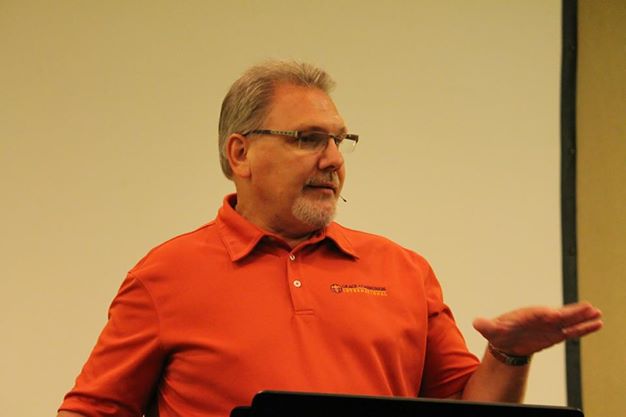
The full title of the course, Christian Leadership: Foundational Perspectives, Principles and Practices for Lifelong Growth as a Leader, pretty well sums up its focus and content: challenging students to adopt a life-long perspective on leadership, including a commitment to lifelong learning. As fellow life-long learners, Greg and Charles will help each student reflect on key foundational elements that can contribute to their growth as leaders across a lifetime.
The following questions will be addressed in the course:
Students should plan to arrive in Dallas for the course seminar by the evening of December 9 (we’ll have dinner together), ready to go early December 10. The seminar will continue through late afternoon December 12. To prepare for the seminar, students will need to read two books and bring to the seminar a short written review of each one.
To register and arrange for lodging, follow this two-step process:
Once you complete this two-step process, Charles Fleming, will send you information concerning the books that will need to be read and write about prior to attending the the seminar. If you do not receive a confirmation email message after registering please call 800-574-2299.
Here is part 5 of an 8-part essay by Dr. Gary Deddo titled “The Christian life and our participation in Christ’s continuing ministry.” To read other parts, click on a number: 1, 2, 3, 4, 6, 7, 8. For all 8 parts combined in one article, click here.

In part 4 we saw how union with Christ is a way of talking about our core identity in terms of our meaning, significance, security, dignity and destiny. This identity is both a gift given, and a settled fact. Because Jesus is alive—still fully and really human as one of us—and because he continues to minister by his Spirit on the basis of his accomplished work, we are able to participate and have fellowship and communion with him in everything we do. But what does our participation with Jesus in his continuing ministry look like? The New Testament gives several examples. Here in part 5 we’ll look at one of them in depth.
Though we can live in denial, hiding the truth by attempting to depart from Christ, doing so cannot undo the truth of who we actually are in Christ. We may get splinters, but we cannot change the grain of the wood when we go against it. The only choice we really have is 1) to affirm the reality with our minds and in our actions, or 2) deny the reality of who Christ is and who we are in relationship to him.
In seeking to honor Christ in their actions, some ask, What would Jesus do? But a better question, if we want to truly participate with Christ, is this: What is Jesus doing? Answering this question leads us to seek to discover what Jesus is doing in the present situation and consider how we can get involved with his activity. When we see the depth of the grace of God in uniting us to Christ to share with us his communion with the Father, what else can we possibly do with our lives except to go where he goes, do what he does, and live for the glory of the Father as he always has and still is doing?
The story told in Mark 6:30-44 illustrates how our union with Christ and our participation in his ministry are held together. As it begins, Jesus took some unanticipated initiative. He told the disciples that they should feed these 5,000 people. They’d been listening to the teachings of Jesus until very late that afternoon. There was, perhaps, just enough time to get home by nightfall to prepare supper. So the disciples were astounded at Jesus’ suggestion. How could they possibly feed so many? They didn’t have two years’ worth of wages in their wallets to buy bread, and they certainly didn’t have a chain of bakeries ready to deliver truckloads of it.
Jesus had asked them to do the impossible. But Jesus was not stymied by their incredulity. He had another word for them: “How many loaves do you have? Go and see.” I’m sure the disciples must have wondered at the relevance of such a request. But it got worse. The results of their count yielded only five loaves and just two fish. The disciples did not know what to do next.
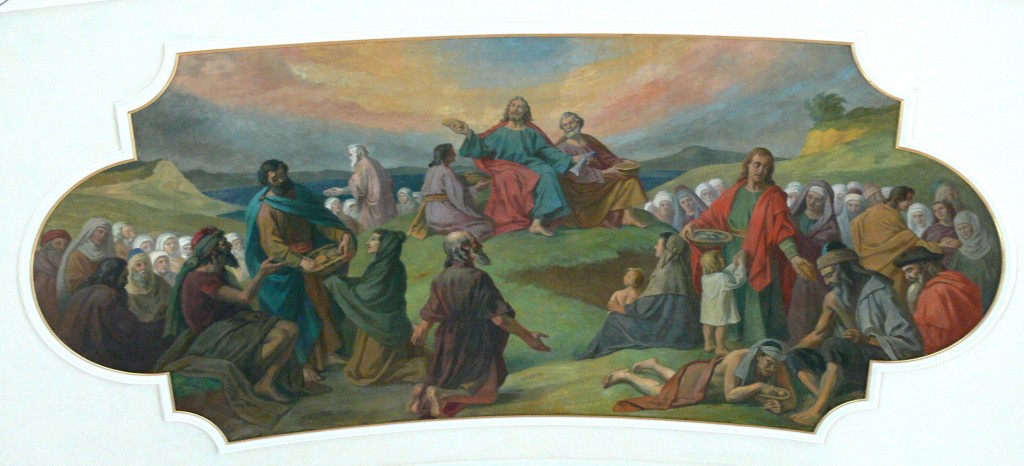
Jesus provided some leadership. He directed the disciples to get all the people to sit down in groups. The people actually did what the disciples asked, though it would not have been clear what would follow. Some must have muttered, “It’s getting a little late, isn’t it? I thought he was finished.” Next, Jesus took from them the loaves and fish. He looked up to heaven, directing his gaze and his words of thanksgiving for the food to his heavenly Father, for what was going to take place not only would involve Jesus and his disciples but also Jesus with his Father. He broke the fish and loaves in pieces to distribute to the twelve standing around him.
Then the disciples were called back into action. Jesus directed them to hand out the food to the people. I suspect that the people followed the example of the disciples and broke off pieces to give to those next to them. Almost without realizing (Mark here is so understated!), “they all ate and were filled.” Not only that, but from those five loaves and two fish, there were twelve baskets full of broken pieces of bread and fish leftover! Twelve baskets—one for each of the disciples. Can you imagine their reaction as each one brought back a basket full after handing out just a few scraps?
How did this happen? We could simply say Jesus performed a miracle. Of course, but how did he go about it? Was it with great fanfare, a spectacular Hollywood magic show complete with light, mirrors and smoke by which the amazing Jesus impressed us again with his phenomenal powers? Not at all. Jesus did not multiply the loaves and fish by himself. In fact, he drew very little attention to himself. In lifting the food to heaven and saying a blessing, Jesus understood himself as dependent on his Father. This situation was like all the others he encountered in his earthly life: Jesus only did what he saw his Father doing (John 5:19).
Jesus participated in the actions of his Father. Further, Jesus had said to the disciples, “You feed them,” and they did. Jesus (with his Father) not only could have provided the loaves and fishes, but he could have had the disciples stand back, saying “Watch this, boys!” and sent those loaves and fishes flying instantly right into the laps of all 5,000. What an amazing magical moment that would have been! But he didn’t go about it that way at all. He involved his disciples. They participated with him in feeding the hungry.
I am not suggesting that Jesus needed the disciples—or even their fish and loaves. That would be a gross misrepresentation of the truth. But rather, Jesus delighted to find ways for his disciples to get involved in the very things he and his Father were doing. Did these disciples have the understanding or the resources needed for the task? Not at all. But Jesus found a wonderful way for them to participate in his humble exhibition of the divine compassion of his heavenly Father. The disciples got to be involved in the very thing Jesus (and his Father) was doing. I’m sure they were astounded—not just that all the people got fed, but that he took what was theirs, made it his own, and then gave it back to them to serve the people in his name. Can you imagine the joy and wonder of being involved in God’s feeding of 5,000?
This Gospel story illustrates Christian life and ministry. What is needed, good and right, is always overwhelming, even seemingly impossible. We hear a word from Jesus that sounds like “You feed them,” and we quickly become aware that we have so little. It’s humiliating, at least to our pride, to admit how meager our resources are compared to the compassionate aims of God. At that point the question becomes, Will we act in faith, trusting in the character of the one calling for our action and obedience? Will we give him what we have so we can see what he will do with what little we really offer to him?
We may offer to him our failures and our sin in confession, or offer our resources, action plans and obedience with thanksgiving. Will we trust him to do with our meager action just as he did with those first disciples? Will we marvel at the miracle of participating in Christ’s own obedience to the Father in his continuing ministry to his neighbors and his world? That’s the wonder of Christ’s Lordship—he always makes room for our participation, though we never really have what it takes. It is only in partnership with him, in fellowship and communion, in union with him, that we reflect the glory of God as his children.
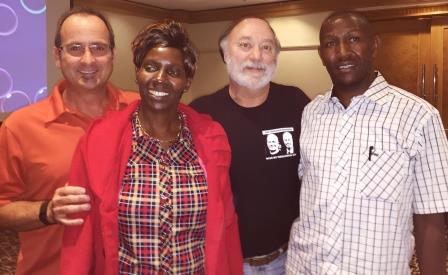 This update is from Anthony Gachanja, GCI’s national director for Kenya. Anthony has been visiting GCI members in congregations scattered across Kenya, bringing them encouragement. Recently, the members have been reciprocating by visiting Anthony and his wife Jane at their home (they are pictured at right on another occasion with Charles Albrecht and Joseph Tkach).
This update is from Anthony Gachanja, GCI’s national director for Kenya. Anthony has been visiting GCI members in congregations scattered across Kenya, bringing them encouragement. Recently, the members have been reciprocating by visiting Anthony and his wife Jane at their home (they are pictured at right on another occasion with Charles Albrecht and Joseph Tkach).
Here in Kenya we are doing quite well. We thank God for his grace. An interesting trend has been happening—members of our churches have been visiting my family here at our home, and this has really encouraged us. Some of the groups have called these visits, “a time for paying back.” According to them, they have visited us for two reasons: To show us they have been appreciating our visits to their churches, and to get to know our home. Three churches have visited us in the last three months and a fourth is working on a time for their visit. Our house is open to all. The photos below were taken during these visits.

On September 27, Associate Regional Pastor Tim Sitterley had the blessing of installing Bill Kranich, Martin Registe and Susan Krueger as the members of a new Pastoral Team that will be serving GCI’s congregation in Anchorage, Alaska. The team replaces retiring Lead Pastor Don Marson.
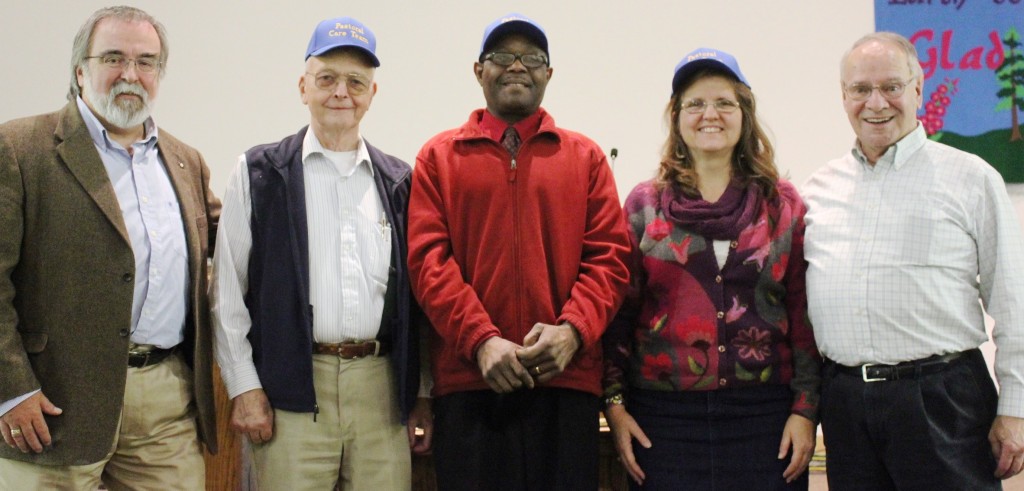
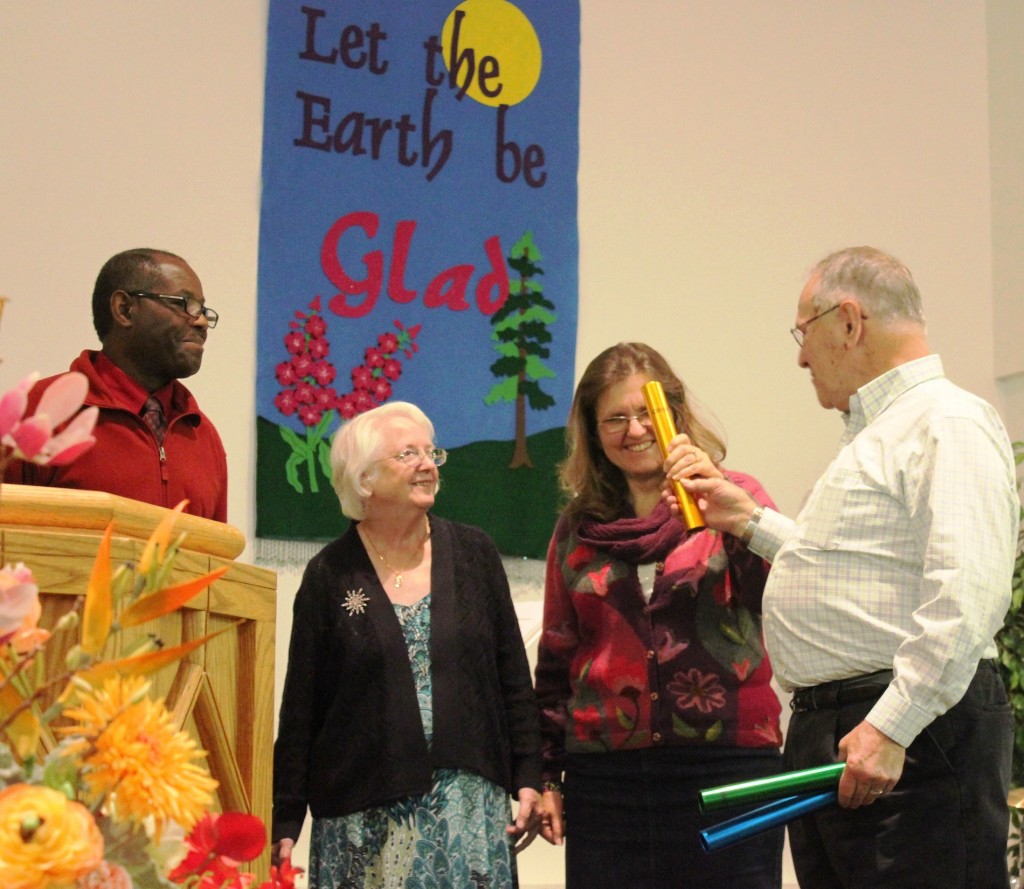
Don, with his wife Anne Marie (pictured below), has served in some form of ordained ministry for over 40 years, including the last seven as lead pastor in the Anchorage congregation. Don and Ann Marie will remain as members of the congregation, and have plans to travel frequently.
Our sincere thanks to the Marsons for their many years of ministry and our congratulations to the new pastoral team.
Dear Brothers and Sisters,
 Though you’ve probably not heard of Austrian immigrant Leo Hirshfield, I’m sure you’re familiar with what he invented in 1896—an oblong, individually wrapped, bite-size piece of chewy chocolate candy, which Leo named after his five-year-old daughter nicknamed Tootsie. That invention, of course, is the Tootsie Roll, which Hirshfield sold in his New York City candy store for a penny a piece. Now in 2015, 64 million pieces are being made daily by Tootsie Roll Industries.
Though you’ve probably not heard of Austrian immigrant Leo Hirshfield, I’m sure you’re familiar with what he invented in 1896—an oblong, individually wrapped, bite-size piece of chewy chocolate candy, which Leo named after his five-year-old daughter nicknamed Tootsie. That invention, of course, is the Tootsie Roll, which Hirshfield sold in his New York City candy store for a penny a piece. Now in 2015, 64 million pieces are being made daily by Tootsie Roll Industries.

It was 36 years after the Tootsie Roll was invented that Lukas Weisgram added a flavored hard candy shell to a piece of Tootsie Roll and named it the Tootsie Pop. That the shell conceals the chewy center gives rise to a well-known question: How many licks does it take to get to the center? Tests indicate it takes from 600 to 800, but if you’re like me, you bite through the shell to get right to the good stuff in the center.

Though sad, it’s interesting that the Tootsie Pop’s construction can serve as a metaphor for those who, instead of getting to the true center of biblical truth, remain fixated on peripheral issues that tend to conceal (even negate) the “good stuff” found at the center. Some authors and preachers “major in the minors”—virtually ignoring the true center of Scripture and Christian faith, offering instead novel (one might say fanciful) ways to find what they wrongly suppose to be the center.
One author counted the total verses in the Bible (31,174 in one English translation) in order to locate the middle verse (Psalm 118:8 by his calculation). The same author felt confirmed in his approach by noting that Psalm 117 is the shortest chapter in the Bible (2 verses) and Psalm 119 is the longest (176 verses). Though such calculations may be interesting, they certainly are not the way to find the Bible’s true center.
Others have used even more fanciful (one might say superstitious) ways of identifying the Bible’s true center. A popular approach in our day is a method referred to as “Bible code,” which searches out secret messages supposedly hidden in the text of the Bible. Individual letters, which are lifted out of the text at equal intervals, are put together to reveal the hidden message. But this approach is utter nonsense. By using the same approach you can find messages hidden in any book of sufficient length. There is no valid reason to think that the central meaning, purpose and message of the Bible can be discovered by counting words or by deciphering hidden messages. Such fanciful and superstitious approaches have been debunked time and again.

The true center of the Bible is not a verse at its middle or a message hidden away in its text, but a person—Jesus Christ. Not only is he the Bible’s true center, he is the center of the universe—all that was created was created by him, for him and through him. Jesus is not just the center of the Christian faith—he is the center of all things and Christianity came into being and was named after him. Jesus inaugurated a new way of living for humanity—he lives in us and we live in him by the personal activity of the Holy Spirit.
According to Jesus, the primary reason for the Bible is to bear witness to him. The Bible is God’s story of redemption and salvation—Jesus. The story of grace—Jesus. The story of the way, the truth and the resurrection—Jesus. The story of eternal life—Jesus.
Out of his personal knowledge, Jesus reveals to us the Father and the Spirit. He reconciles us and brings us into the very presence of the Father and the Spirit. He is the reason for the Bible and its author, focus, theme and main character. Jesus is the true center.
The Gospel of John tells us that Jesus is the Word—the ultimate word of God for us and to us. God’s definitive form of speech is the inscription of God’s word to us in the person of Jesus. This is the truth with which John begins his Gospel:
In the beginning was the Word, and the Word was with God, and the Word was God… The Word became flesh and made his dwelling among us. We have seen his glory, the glory of the one and only Son, who came from the Father, full of grace and truth (John 1:1, 14).
Consequently, Jesus (the Word) alone can give us authoritative knowledge of the whole Triune God:
No one has ever seen God, but the one and only Son, who is himself God and is in closest relationship with the Father, has made him known (John 1:18).
The writers of the Bible (the written word of God) tell us that the ultimate, final, definitive living Word of God is none other than the Word of God made flesh, Jesus Christ. Jesus is the living Bible, the incarnation and inscription of the very nature and truth of God. Yes, Jesus is the true center.
Staying centered on him,
Joseph Tkach
PS: October is pastor appreciation month, and though I’m deeply grateful for our pastors every month of the year, I want to take this opportunity to express my special thanks to each of them, and also to their spouses who serve with them. As a fellowship, we are greatly blessed to have faithful, humble servant-leaders to care for our part of the body of Christ. Pastors, please take care of yourselves too (and those who love them, please help them do so)—for a brief message highlighting that need, click here.